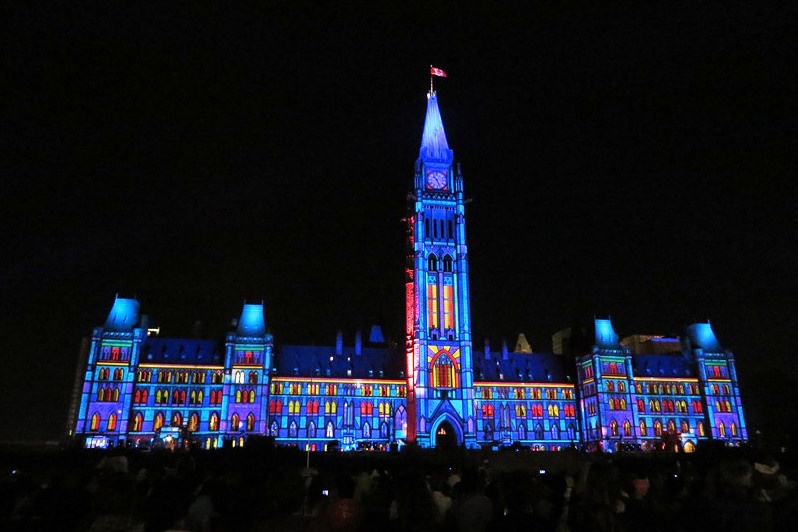This summer, Catherine Lu decided to write up a list of reasons to vote against the Conservative Party of Canada in the current federal election. Over a period of 40 days, she came up with one new reason per day, which she posted to her Facebook page. In recognition of her labours, over the next few days we will republish them here:
Prologue
Earlier this summer on a short visit to Ottawa, I happened to see the ‘Northern Lights’ show, a visually-stunning light display over the Parliament Buildings that tells the story of Canada to visitors of the great institutions of Canadian democracy. I was dismayed that after seeing this show, a visitor to Canada might leave thinking that relations between indigenous peoples and arriving settlers were based on ‘mutual interest’ and exhibited ‘partnership’, rather than dispossession and genocide; and that World War One was a meaningful sacrifice of Canadian lives that helped to build the nation, rather than a monumental and meaningless political catastrophe that generated irretrievable losses for thousands of families. But the show did serve the purpose of stimulating me to think more deeply about Canada, its past, present, and future. As we approach a federal election, it’s time for all Canadians to engage in a similar exercise. My own reflections have led me to the following forty reasons why Canada needs to change course. Whatever one’s political stripe, Canadians should emphatically discontinue the mandate of the present Conservative government under the leadership of Stephen Harper.
Reason #40
The Harper Conservative government wants Canadians to love our country, but ‘true patriot love’ does not require adopting a white-washed and sugar-coated view of Canadian history. And it certainly doesn’t include padding Canada’s CV with the names of accomplished people who had summer homes in Canada. According to the ‘Northern Lights’ show, you might think that Alexander Graham Bell, inventor of the telephone, was a great Canadian. The Harper government’s study guide for Canadian citizenship also includes Bell under ‘Great Canadian Discoveries and Inventions‘: ‘Alexander Graham Bell — hit on the idea of the telephone at his summer house in Canada.’ But according to the biographical memoir of Mr. Bell published the U.S. National Academy of Sciences, Mr. Bell was immensely proud of being a citizen of America, not Canada. Although he died in Nova Scotia, he requested that the epitaph on his gravestone read, ‘Died a citizen of the U.S.A.’
Reason #39
How many Alexander Graham Bells is Canada going to miss with the revised citizenship laws introduced by the Harper Conservative government that have just come into effect? In fact, would Bell have even become a Canadian citizen? He moved to Brantford, Ontario with his father in August 1870, and left in March 1871 for a teaching assignment in Boston. One can imagine the letter he would have received from Citizenship and Immigration Canada, had he applied:
Dear Mr. Alexander Graham Bell, Thank you for your application for Canadian citizenship. Your application has been rejected. Let’s be honest, you are a ‘Canadian of convenience,’ are you not, Mr. Bell? We know that your father forced you to move to Canada to improve your health and avoid the fate of your two brothers who died of tuberculosis. This is a very instrumental reason for moving to Canada.
Now you say that you should be granted Canadian citizenship. But please note the residency requirements: “Adult applicants must now be physically present in Canada for at least 1,460 days (four years) during the six years before the date of their application, and they must be physically present in Canada for at least 183 days in each of four calendar years within the qualifying period. This is aimed at ensuring that citizenship applicants develop a strong attachment to Canada.” According to our records, you only arrived in August last year (1870), so your application is quite premature.
Furthermore, you have failed to satisfy Paragraph 5.1(c.1) of the Citizenship Act, which states that you must intend to reside in Canada, after being granted Canadian citizenship. We understand, however, that you intend to take a position at a school for the deaf in Boston, which is located in the United States of America.
Please remember that “citizenship is not a right, it’s a privilege,” Mr. Bell. These changes to the Citizenship Act are “designed to send a message that Canada is looking for people who plan on settling in the country permanently and spending time here.” Although you must be disappointed with this outcome, please do not apply again. If you lie on your application, for example declaring that you intend to reside in Canada, under the new regulations, I also have the power to strip you of citizenship once I can show that you have lied on your application.
Sincerely,
Minister of (Non-)Citizenship and (Non-)Immigration
Reason #38
Last year, Canadians were told that it was ‘absurd to suggest that making applicants declare their “intent to reside” in Canada will be later used as an excuse to strip them of their citizenship if they work abroad.’ Citizenship and Immigration Chris Alexander denied flatly that revocation of citizenship would happen. “There’s no requirement for a citizen of Canada to remain physically in Canada, once granted in citizenship,” he said. That’s right! According to the Canadian Charter of Rights and Freedoms, ‘Every citizen of Canada has the right to enter, remain in and leave Canada.’ But now the Harper Conservative government is saying that Canadian citizens who dare to live outside of Canada (for five years) will lose a fundamental right of citizenship: the right to vote in federal elections. It was the former Conservative Prime Minister Brian Mulroney who opened the door to expats voting in federal elections in 1993, and later Liberal governments allowed the five-year clock to be reset for those who returned even for short visits. That changed under the Harper Conservative government in 2007, when Elections Canada started to enforce a restrictive version of the five-year rule, requiring expats to ‘resume residency’ in Canada in order to regain their right to vote. Not only does this restrictive interpretation go against past conservative dispositions, it also seems to contradict Section 3 of the Canadian Charter of Rights and Freedoms, which states, “Every citizen of Canada has the right to vote in an election of members of the House of Commons or of a legislative assembly and to be qualified for membership therein.” Maybe the Harper Conservative government will introduce changing the Charter’s name to the Canadian Charter of Privileges and Restrictions.
Reason #37
If you, like me and 22% of the Canadian population, were born outside of Canada, (or if you’re part of the 17% of the population of second-generation Canadians born in Canada, but with one parent born outside of Canada, making you possibly eligible for citizenship in another country,) you might think that Harper’s Conservative party is not like other Conservative right-wing parties of the past that endorsed anti-immigrant platforms, such as restricting immigration of non-white people to Canada, and opposing government-sponsored multiculturalism due to its product of a ‘hyphenated-Canadian’ identity
After all, if you’re Asian, don’t you get a greeting card from Prime Minister Stephen Harper and his family every Lunar New Year, whether you celebrate it or not?
And do you really need to worry about official discrimination any more when Section 15 of the Canadian Charter of Rights and Freedoms guarantees that ‘every individual is equal before and under the law and has the right to the equal protection and equal benefit of the law without discrimination and, in particular, without discrimination based on race, national or ethnic origin, colour, religion, sex, age or mental or physical disability’? The new Citizenship Act crafted by the Harper Conservative government that came into force this year, however, introduces a new way to discriminate against immigrant and hyphenated Canadians by granting the federal government the power to revoke Canadian citizenship as an additional penalty for convictions of terrorism, treason, or espionage, but only if the offender is a dual national or is eligible for citizenship from another country. Previously, all Canadian citizens who committed these offences were treated equally under the law: their penalties differed based on the seriousness of their crimes, rather than on the arbitrary fact of whether or not they carried another passport. In effect, the Harper Conservative government has made second-class citizens of nearly 40% of Canadians (who are first- and second-generation Canadians)!
Reason #36
In calling the election, Stephen Harper made his pitch to Canadians to vote for his party, saying, ‘This is no time for risky plans that could harm our future.’ Yet prominent conservatives are charging that it is the Harper Conservative government that has adopted ‘reckless, dangerous and ineffective’ policies that will ruin Canada’s future. Canadians governments have adopted such policies in the past, such as in 1942, when in the name of national security, it ordered the removal of Japanese Canadians from the B.C. Coast and interned them in make-shift camps in the interior. Most Canadians look back on that episode with shame. The Canadian Charter of Rights and Freedoms contains guarantees of individual rights against arbitrary and abusive state power. Now, however, the Harper Conservative government has passed legislation that empowers the police to arrest citizens whom they suspect ‘may’ commit a crime, and enables Canada’s security intelligence agency to violate citizens freedoms and rights that are protected by law. Principled conservatives see this legislation for what it is, the exploitation of Canadians’ anxieties about security in order to expand state powers and make such power less accountable.
Reason #35
The Harper Conservatives have been fear-mongering on the terrorism front, but almost oblivious to another major concern of Canadians: rising inequality. Canadians know that inequality has increased in Canada, an increase that began in the mid-1990s, partly due to Canada’s tax and transfer systems having less redistributive impact than it did in the 1970s and 1970s. Now the average income of the richest 10% of the Canadian population is ten times that of the poorest 10%. Do Canadians want this inequality to increase further? By increasing the Tax-Free Savings Account (TFSA) limit and introducing parental income-splitting (known as the Family Tax Cut), the Harper Conservative government seems to think so. Who will benefit from parental income-splitting? Not single parents, most of whom are single mothers, since they won’t have another parent with whom to split their income to benefit from the tax cut. Not the bottom 20% of two-parent income families, since they don’t make enough combined to qualify for the tax cut. But 27% of households in the 80th percentile of income and better are projected to benefit from the Family Tax Cut. Overall, this tax cut is expected to benefit 15% of Canadian families, and most of them in the middle to high-income households. Similarly, according to the Parliamentary Budget Officer, ‘the TFAS program is regressive, overall. Benefits skew to higher income, higher wealth and older households.’ The PBO also projects that the federal government would lose $14.7-billion a year in revenue by 2060, and the provinces would lose $7.6-billion a year.
Reason #34
Both of my parents lost their jobs for about a year when there was a downturn in the economy in the early- to mid-1980s. It was a stressful year for all involved. Having arrived in Canada in 1976 (and with practically nothing), they had worked for less than ten years in Canada. Should they have gotten less unemployment benefits than their other colleagues who had lived and worked in Canada all their lives? In general, should those people who already have done well in the labour market get more employment benefits than those who are in a worse position in the labour market? Yes, based on the Harper Conservative government’s changes to the Employment Insurance (EI) rules that came into effect in 2012. Since then, a large majority (75%) of the people who became unemployed and made EI claims received less than the full unemployment benefits, because they worked for less than ten years, or were employed in temporary jobs, including seasonal jobs. The logic of the change equates people who need employment insurance on an occasional or regular basis as similar to ‘repeat offenders’ in the criminal justice system. But the Canadian economy, since 2008, has been producing three times more temporary work than permanent employment (‘an increase of 14.2 per cent for temp work between 2009 and 2012, versus 3.8 per cent for permanent workers’). Most of the growth in temporary work has been among young people; temporary positions tend to pay less in wages, and provide less benefits overall, not to mention no job security. If the contemporary nature of the Canadian economy is producing these temporary jobs as well as seasonal work, why should the people who must take these jobs be penalized when it comes to unemployment benefits, as if it were their choice only to do seasonal work or have temporary jobs?
Reason #33
The Harper Conservative government isn’t just being unfair to the unemployed. It has wielded arbitrary power over a much more vulnerable group: downtrodden refugee claimants. The Harper government arbitrarily designated some (over 40) countries of origin as inherently ‘safe’, thereby pre-judging refugee claimants from those countries as ‘bogus’, then justifying the denial of medical care to them based on this false verdict. This policy is not only unhumanitarian and ‘cruel’, violating the Canadian Charter of Rights and Freedoms, it is also grossly unfair to these refugee claimants, hundreds of whom will become future citizens of Canada. According to the Harper Conservative government, being forced by a federal court judge to reinstate health care for refugee children under 19 years, and for pregnant women, costs $4 million. Meanwhile, the government has spent $1.4 million on the court case, and is appealing the federal court ruling. In other words, the Harper Conservative government thinks it’s perfectly permissible, in the name of deterring/reducing fraudulent refugee claims, to grossly mistreat innocent refugee claimants, the most downtrodden members of humanity.
Reason #32
Being tough on crime and punishment does not mean using prison and solitary confinement to punish the mentally ill or solve social problems. That’s just mean and wrong. While Canada’s crime rate has fallen to its lowest level since 1969, the incarceration rate has gone up in the past fifteen years (from over 12,000 to 15,000). And in response to a report by prison ombudsperson, Howard Sapers, about the overuse of solitary confinement, and increased use against ‘federally sentenced women with mental health issues, Aboriginal and Black inmates’, the Harper government has decided to let the ombudsperson go, rather than implement his reasonable and sensible recommendations: ‘to limit the use of administrative segregation, prohibit its use for mentally ill inmates and for younger offenders (up to 21 years of age), impose an initial limit of no more than 30 days, and introduce judicial oversight or independent adjudication for any length of stay in segregation beyond 30 days.’
Reason #31
Canadians know that a basically just society does not discriminate between groups in the provision of basic social services. But one vulnerable group of children in Canada do not enjoy fairness in treatment when it comes to government assistance for their protection and welfare. The First Nations Child and Family Caring Society of Canada figured out in 2007 that the federal government has been funding child welfare services on-reserve at a much lower rate than provincial governments fund child welfare services, leading to indigenous children on reserves receiving 22 to 34 percent less funding than other non-indigenous children who go into care. Did Cindy Blackstock, the indigenous children’s rights advocate, receive a medal for helping the government to identify this discriminatory practice that adversely affects First Nations children, youth and families? No, instead, the Harper Conservative government spent its resources going to court to try to get off on a technicality, in order to prevent the Canadian Human Rights Tribunal from hearing the case. The Tribunal did hear the case, thanks to a federal court judge, and a decision is expected this year.
Catherine Lu is an Associate Professor of political theory at McGill University, and is currently a Visiting Senior Fellow in the Department of Government at the London School of Economics and Political Science (LSE).





I ain’t changing my vote because Alexander Graham Bell was an American and “they’re conservative – you know what means? They’re RACIST!!!! This a well known fact: if you disagree with the conventional progressive wisdom you are automatically racist. And if you thought that first-generation Canadians being more likely to vote for them than ‘old stock’ Canadians throws a wrinkle in that argument, well, I’m a professor, so, who are you going to trust – dumbo immigrants that don’t know their own minds and RACISTS, or the professor? Also, if you disagree with me about anything you are a RACIST.” I also worked outside Canada for five years and think it is perfectly appropriate for people in that situation not to be able to vote in Canadian elections. But hey, evidently I’m about as dumb as all those Chinese voters that aren’t academics, and plus I must be a racist, so…
Aaaaaaaanyways, I could go on down the list, but what would be the point? I could have come up with a 100 point list of my personal grievances against the Liberals circa 2005, only I wouldn’t have wasted my time, because my personal hobbyhorses have not a damn thing to do with switching over persuadable voters. Neither do fourty-minutes-of-Harper-hate cathartic performances amongst a bunch of identically-minded academics. Nevertheless, keep it up I say! Talking in hyper-partisan echo chambers is always a pleasant distraction from all the research on “theories of democratic deliberation under conditions of radical pluralism and diversity” that isn’t getting done.
On a sidenote, I chortle with delight everytime I read concern trolling b.s. about how “principled conservatives” woyld allegedly join the progressives’ latest two-minutes-of-Harper-hate spectacle. Say, concern trolls: have you ever had a good thing to say about a “conservative” who: (1) won an election (2) was actually conservative? I didn’t think so. So please keep your paens to Joe Clark to yourself. On the other hand, if you value actual “principled conservatives” at all, what better way to demonstrate it than to show your support of the people who are most concerned with refining conservative principles…conservative academics? No? Because they’re all racists, amirite? Can’t have those people around! Let’s keep warming the fires over here with our “progressives divided over heated differences about which variety of jargon and abstract theoretical framework is most appropiate for expressing our totally uniform opinions” debates.